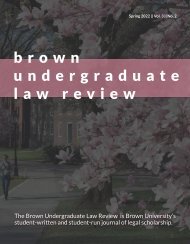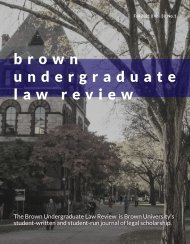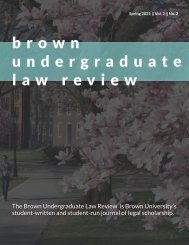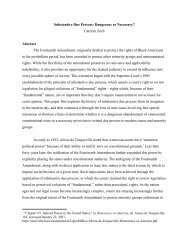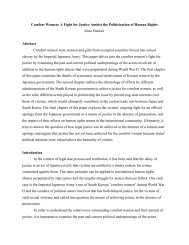Brown Undergraduate Law Review -- Vol. 2, No. 1 (Fall 2020)
We are proud to present the Brown Undergraduate Law Review's Fall 2020 issue. We hope you will all find our authors' works fascinating and thought-provoking.
We are proud to present the Brown Undergraduate Law Review's Fall 2020 issue. We hope you will all find our authors' works fascinating and thought-provoking.
You also want an ePaper? Increase the reach of your titles
YUMPU automatically turns print PDFs into web optimized ePapers that Google loves.
Land Grabs and the Reach of the Law: Reforming Large-Scale Land Acquisition in Sub-Saharan Africa
SSA span tens of thousands of hectares (e.g., the median century? nearly 90 percent of rural farmland in SSA
landholding in Liberia is upwards of 50,000 ha). 7 The land remains unregistered. Lack of registration means the land
is primarily used to cultivate flex crops? mostly is vulnerable to government seizure and subsequent land
sugarcane, oil palm, soybean, maize, and jatropha used for acquisition by foreign investors. 12 Government officials, in
food, feed, or to make biofuel? and for wood and fibre some instances as a matter of official development policy
production. 8 The majority of the acquired land is leased for and in others due to corruption and payoffs, are often at
up to 99 years. 9 The Land Matrix reports that there are odds with local communities. In unusual instances, state
currently 655 active deals (>200 ha), both concluded and representatives may coordinate foreign land deals with
intended, that are being pursued by investors in Africa; local leaders in order to negotiate processes of regional
however, this statistic is likely an underestimate as many land administration, as is often the case in Madagascar. 13
deals are not officially documented. 10
Due in part to such ?overlapping jurisdictions,? land deals
tend to have ?little coordination, and low negotiation
Over the last few years, SSA land acquisitions have grown
capacity;?
increasingly complex, presenting a wide array of
14 therefore, contracts can often be littered with
cartographic inconsistencies, and may include
ownership and financial configurations. The land deals are
?stabilization clauses,? which effectively prevent host
usually made between foreign investors? ranging from
countries from altering investors?prearranged regulations
agribusiness companies to sovereign wealth funds from the
(e.g. environmental protections and worker compensation).
United States, China, Britain, Singapore, and Saudi
Arabia 11 Much of this disorganization and asymmetric negotiation
? and domestic state actors. Note, however, that
capacity is by design? investors seek out states with
LSLAs should not be understood merely as capitulations
?weak tenure security and governance [of their land
of ?the state? to foreign entities; rather, the state actor must
sectors]?? among them the Democratic Republic of the
be viewed as a multifarious, active body, composed of
Congo (DRC), Sudan, Madagascar, and Ethiopia.
diverse actors and incentives. Because a substantial
15
Ultimately, structural deficiencies and corruption in host
majority of SSA countries have maintained outdated
countries allow land operators to more effectively establish
systems of land governance? including surveying and
property rights and extend control over their assets.
mapping methods that date back to the mid-20th
7. Klaus W. Deininger and Derek Byerlee, Rising Global Interest In Farmland: Can it Yield Sustainable and Equitable Benefits? (2011), 62.
8. Caterina Conigliani, et al., ?Large-Scale Land Investments and Forests in Africa,? Land Use Policy, vol. 75 (June 2018), 3.
9. Donald L. Sparks, ?Large Scale Land Acquisitions In Sub-Saharan Africa: The New Scramble?? International Business & Economics Research
Journal, vol. 11, no. 6 (June 2012), 689.
10. The Land Matrix. International Land Coalition (ILC).
11. Mazzocchi et al., ?The Determinants of Large-Scale Land Acquisitions (LSLAs),? 2.
12. Frank Byamugisha, Securing Africa?s Land for Shared Prosperity: a Program to Scale Up Reforms and Investments, (2013), 104.
13. Wendy Wolford et al., ?Governing Global Land Deals: The Role of the State in the Rush for Land,? Development & Change, vol. 44, no. 2
(March 2013), 192?193.
14. Sparks, 690.
15. Rabah Arezki, et al., ?What Drives the Global ?Land Rush??? World Bank Economic Review, vol. 29, no. 2 (2015), 209.
Brown Undergraduate Law Review
22




